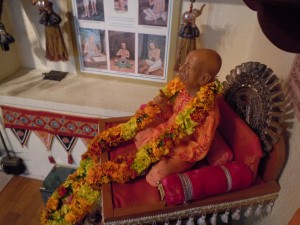Paris aug 5 1976 conversations….
Prabhupāda: Without becoming jñānī, nobody can become bhakta. Without knowledge, if one has become bhakta, he’s sentimentalist. It is stated in the Bhagavad-gītā, find out this verse. Samaḥ sarveṣu bhūteṣu mad-bhaktiṁ labhate parām [Bg. 18.54].
brahma-bhūtaḥ prasannātmā na śocati na kāṅkṣati samaḥ sarveṣu bhūteṣu mad-bhaktiṁ labhate parām [Bg. 18.54]
(French translation read) So without becoming fully in knowledge, nobody can become devotee.
Bhūgarbha: He asks, What about the opposite, people becoming devotees without knowing anything? He asking…
Prabhupāda: No, devotee cannot be without knowing anything. A devotee means, a devotee means he knows everything. Kasmin tu bhagavo vijñāte sarvam idaṁ vijñātaṁ bhavati. This is Vedic injunction. One who knows the Absolute, he knows everything.
Yogeśvara: Śrīla Prabhupāda? That verse, does that mean that one who is neophyte…
Prabhupāda: Neophyte is neophyte. Why do you bring him to become a devotee? A devotee is different. A “one plus one equal to two,” he’s not mathematician. He’s learning. There is hope one day he’ll be a big mathematician. There are three stages, kaniṣṭha-adhikārī, madhyama-adhikārī, uttama-adhikārī. So when you speak of devotee, that is this uttama-adhikārī. So he knows everything. Rather, the so-called jñānī, he does not know. Because he does not know Kṛṣṇa. The so-called jñānī, he does not know what is Personality of Godhead. He’s impersonalist. Therefore he is still unaware of the Absolute Truth. Therefore he’s not jñānī. His jñāna, his knowledge, is lacking. Therefore in the Bhagavad-gītā it is said,
bahūnāṁ janmanām ante jñānavān māṁ prapadyate vāsudevaḥ sarvam iti sa mahātmā sudurlabhaḥ [Bg. 7.19]
If one jñānī is impersonalist, he’s not jñānī. He is still unaware of the Absolute Truth. He does not know. Therefore it will take many, many births to come to the understanding of the Personality of Godhead. Therefore he’s not jñānī, he’s claiming to be jñānī. Such jñānī will take many hundreds of births to come to the position of real jñānī. Find out this bahūnāṁ janmanām ante [Bg. 7.19]. So-called jñānī, after many, many births, when he understands Kṛṣṇa and surrenders to Him, then he’s jñānī. Sa mahātmā sudurlabhaḥ. That kind of jñānī is very, very rare. The impersonalist means ajñānī. Yes. Because he does not know Kṛṣṇa, the person. There is another verse in the Śrīmad-Bhāgavatam: āruhya kṛcchreṇa paraṁ padaṁ tataḥ patanty adhaḥ [SB 10.2.32]. Āruhya kṛcchreṇa, by the jñāna process, is undergoing austerities and penances, one comes to the platform of paraṁ padam, monism, or platform of oneness. But because he has no shelter, he patanty adhaḥ, again comes to the material. Just like so many sannyāsīs in India, they are very learned, they have come to the platform of Brahman realization, but after some time they come to the material field for political work, for social work. They give up this world, brahma satyaṁ jagan mithyā. If jagat is mithyā, is false, why does he come for social work? Just like these people going to the moon planet, but because they do not get any shelter, they take some sand and come back again. So what is the use of going there and spending so much money and come back with little sand, and satisfied, “Now we have studied”? Because they have no shelter. So the jñānīs, they have no shelter. Yes. They may go very high in the sky, but because they have no shelter they come back again. Punar muṣaka bhava, again become a mouse. So that is not jñānī, that is ajñānī. Jñānī is described here, mad-bhaktiṁ labhate parām [Bg. 18.54]. Brahma-bhūta [SB 4.30.20] is jñānī, ahaṁ brahmāsmi. Brahma-bhūtaḥ prasannātmā, “I have nothing to do with material world.” Brahma-bhūtaḥ prasannātmā na śocati na kāṅkṣati [Bg. 18.54], there is no lamentation, there is no hankering. When he has attained that stage, brahma-bhūta stage, reality, then he is entrance in the bhakti. Otherwise a neophyte.
Some Conclusions–Why are there so many different opinions among devotees regarding guru tattva? Is everybody right or are they all wrong and only one type is correct? On principle there cannot be two opinions regarding guru tattva. Just like there cannot be two opinions regarding Krsna Tattva. Why is it that Srila Prabhupada tells us he gave us everything, especially in his books, yet devotees have as many opinions as there are devotees? Are they all right or all of them wrong? The first clue to answering these questions is the above conversation about who is a jnani and who is a neophyte.
Prabhupada tells us right at the beginning that unless one becomes a real jnani he cannot become a bhakta. And at the end of this conversation he shows us that unless we come to the brahman level of consciousness, then we are still neophytes.
What is that (Brahman) Brahma bhuta platform? That is explained in Bhagavad gita- One who is on the spiritual level is always joyful, he never laments when things dont go his way, he never hankers because he cannot get what he wants, he treats all living beings equally and he is a friend to all. Then spiritual life begins, otherwise we are neophytes, not real Vaisnavas or devotees quite yet.
Hare Krsna
damaghosa das



